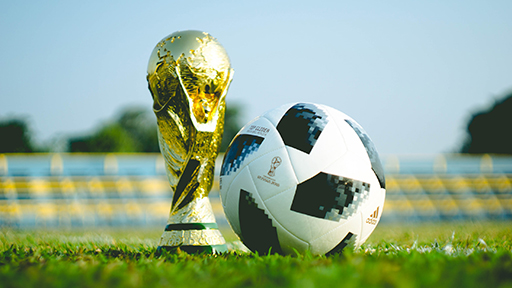1 What makes sport political?
There are occasions where controversies or issues occur that remind us of the relationship between sport and politics. The assumption of sport’s autonomy from wider socio-political contexts has been widely held over the years (Bairner et al., 2016). Historically, sport was considered a perpetual innocent victim, corrupted by its connection with politics. The Fédération Internationale de Football Association, or FIFA as it is more commonly known, itself has experienced significant controversy relating to the internal politics (or the small ‘p’ politics) of the organisation. However, before you delve into FIFA, take a moment to explore what is meant by ‘political’ in this course.
Activity 1 Identifying political themes relating to this course
Watch this video clip and identify the political themes within sport.
Sports and politics: more than just a game [Tip: hold Ctrl and click a link to open it in a new tab. (Hide tip)] (open the link in a new tab or window so you can easily return to the course)
Make some notes in the box below.
Discussion
The video identified several overlapping political themes which can be present within sport. You might have noticed the following:
- Power relations – the ability to attract, hold influence over and persuade, often subtly and implicitly, through the strong symbolism sport offers (e.g., belonging, unity, striking stadia, opening ceremonies).
- Nationalism and identity – sport provides a strong sense of identity and belonging, which can be linked to national identity or resistance to cultural practices, and power relation dominance within countries (e.g., the use of national emblems and anthems).
- Inclusion or segregation – sport participation practices can promote inclusion of some groups and exclusion of others (e.g., women or Black and Minority Ethnic groups).
- Activism – individual athletes or sports teams engaging in activism which places the spotlight on non-sporting issues (e.g., apartheid, taking the knee before a game).
While not explored in the video clip itself, other linked themes could be:
- Conflict – the explicit, openly expressed struggles, debates and power relations between national and/or supranational bodies (e.g., African representation at the football World Cup).
- Commercialisation – sport operates as part of a global system which centres on the commercial interests of lead organisations and its partners. However, challenges between partners can sometimes develop (e.g., Coca-Cola, one of the football World Cup’s bigger and long-standing partners, criticised FIFA for its handling of the investigation into corruption over the bidding process for the 2018 and 2022 men’s tournaments).
It could be suggested that the first point, power relations, sits at the heart of politics. This can work in varying ways, with the potential to operate at different levels within sport. However, as you will learn throughout this course, there is often a lot of overlapping between the themes.
In this course when the term ‘political’ is used, this is referring to one or more of the six different political themes outlined in the activity above.
The politics of sport in this course refers to the activities associated with the governance of a sport, a multi-sport organisation, a sporting region, facility (e.g., club) or league. This is especially pertinent to the tensions within a sport between individuals or groups having control.

